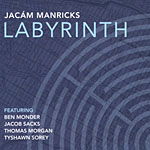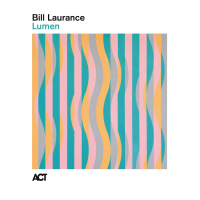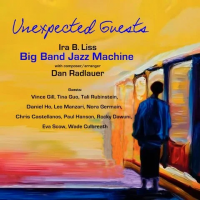Home » Jazz Articles » Album Review » Jacam Manricks: Labyrinth
Jacam Manricks: Labyrinth
Ben Monder
guitarb.1962

Tyshawn Sorey
drumsb.1980
The opening "Portal" plays with a melody from Claude Debussy's "Syrinx for Flute," which Manricks—and later Monder—plays beautifully, while Sacks and Sorey expand its melodic content with complex, tough and gentle rhythms. "Micro-Gravity"'s harmonies references Arnold Schoenberg's "Third Piece," from his "Five Pieces for Orchestra," and feature Manricks' commanding alto sax work floating over an engaging pulse. Manricks creates an impression of labyrinth on the title-composition while confronting the melodic contour of the composition with a consistent rhythm of the bass and piano parts. "Move" suggests subtle dissonances within the chosen harmonies, and an organic sound due to the timbres of Monder's acoustic guitar and Manricks' soprano sax, creating a mourning feeling.
"Cloisters" is another sensitive exploration of angular and rhythmic complex melodies, evoking Manricks' awe upon visiting the ruins of Fort Tyron Park in Upper Manhattan. The peaceful yet melancholic "Aeronautics" features Manricks warm alto sound through carefully built harmonic structures and Monder's sensitive exploration of the harmonic themes. "March and Combat" is a fascinating bolero-like slow waltz that respectfully references both 
Gil Evans
composer / conductor
1912 - 1988
Miles Davis
trumpet
1926 - 1991
Manricks is a remarkable composer, and this release is a superb testimony to his capabilities.
">Track Listing
Portal; Micro-Gravity; Labyrinth; Move; Cloisters; Aeronautics; March & Combat; Rothko.
Personnel
Jacam Manricks
arrangerBen Monder: electric and acoustic guitars; Jacob Sacks: piano; Thomas Morgan: acoustic bass; Tyshawn Sorey: drums; Jacam Manricks: alto & soprano saxophones, flute, alto flute, clarinet, bass clarinet; Chamber Orchestra (2 & 7): violins: Laura Arpiainen, Ann Marie Bernmont, Kiku enomoto, Garry Ianco, Brooke Guiggins; viola: Marla Hansen; Cello: Marla Jeffers; french horn: Amie Margoles.
Album information
Title: Labyrinth | Year Released: 2009 | Record Label: Manricks Music Records
Tags
Comments
PREVIOUS / NEXT
Support All About Jazz
 All About Jazz has been a pillar of jazz since 1995, championing it as an art form and, more importantly, supporting the musicians who make it. Our enduring commitment has made "AAJ" one of the most culturally important websites of its kind, read by hundreds of thousands of fans, musicians and industry figures every month.
All About Jazz has been a pillar of jazz since 1995, championing it as an art form and, more importantly, supporting the musicians who make it. Our enduring commitment has made "AAJ" one of the most culturally important websites of its kind, read by hundreds of thousands of fans, musicians and industry figures every month.









 Buy Now
Buy Now

















